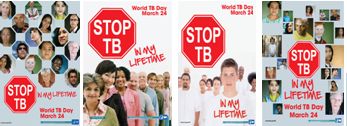World TB Day 2012

World TB Day, falling on March 24th each year aims to increase public awareness about tuberculosis (TB) and to support worldwide TB control efforts including efforts to eliminate the disease. March 24th commemorates the day in 1882 when Dr. Robert Koch announced that he had discovered the TB bacillus which was the cause of tuberculosis. At the time of Koch's announcement in Berlin, TB was raging through Europe and the Americas, causing the death of one out of every seven people and his discovery opened the way towards diagnosing and curing TB. Worldwide, TB remains one of the leading causes of death from infectious disease.
World TB Day 2012
This year, the World Health Organization’s (WHO) Stop TB partnership in adopting the slogan “Stop TB in my lifetime” which supports the theme of calling for a world free of TB.
The slogan and theme encourage people all over the world, from the youngest to the oldest, to make an individual call for the elimination of TB, and to say what changes they expect to take place in their lifetimes.
In their lifetimes, today's children should expect to see a world where no one gets sick with TB.
In their lifetimes, women and men should expect to see a world where no one dies from TB.
People of different ages and living in different countries could have these hopes for stopping TB in their lifetimes leading to:
- No deaths from TB
- Faster treatment
- A quick, cheap, low-tech test for TB
- An effective vaccine
- A world free of TB
World TB Day 2012 - Europe
For World Tuberculosis Day 2012, the European Centre for Disease Prevention and Control (ECDC) is focusing on ‘Urban TB Control’ and is working jointly with four cities in the EU to arrange events on this theme. The cities hosting the events are Barcelona (Spain), London (United Kingdom), Milan (Italy) and Rotterdam (The Netherlands). The aim of this initiative is to increase awareness around urban TB epidemiology and to promote the exchange of experiences on good practices, innovative tools and interventions for enhanced TB control efforts in the big cities of Europe.
Even in low incidence countries, urban TB can be several times higher than in rural areas. In Ireland, while the national TB rate in 2009 was 11.3 per 100,000 (479 cases), it is notable that rates of greater than 20 per 100,000 were reported in some local health areas in urban settings namely Dublin South City, Dublin West, Dublin North Central and Dublin North West. The higher TB incidence seen in big cities of Western Europe poses new challenges and needs to be addressed in order to completely eliminate TB in the EU.
For more details see here
Epidemiology of TB – Ireland
In 2009, (the latest validated figures) there were 479 cases of TB reported in Ireland, a notification rate of 11.3 cases per 100,000 population. This is a slight increase in TB cases notified compared to 2008 when 468 cases were notified and the notification rate was 11.0 per 100,000. In 2010, 427 cases of TB have been provisionally reported giving a notification rate of 10.1 per 100,000.
In 2009, the notification rate for TB in the indigenous population was 7.6 per 100,000 while the rate in foreign-born persons was 33.6 per 100,000. The number of TB cases reported in Ireland has declined since the 1990s with 604 cases reported in 1992, a rate of 17.1 per 100,000. The decline has been even more considerable since the early 1950s when 7,000 cases of TB were notified annually.
Full details on the Annual TB Report 2009 (including provisional 2010 TB data) are available here
More information on TB is available at:
HPSC website
http://www.hpsc.ie/hpsc/A-Z/VaccinePreventable/TuberculosisTB/
Epidemiology of TB in Ireland 2009 (includes Provisional 2010 data)
ECDC website
ECDC Tuberculosis Health Topic including World TB Day 2012 available at:
http://ecdc.europa.eu/EN/HEALTHTOPICS/TUBERCULOSIS/Pages/index.aspx
WHO Europe website
World Tuberculosis Day 2012: Stop TB in my lifetime!
On the occasion of World TB day, WHO/Europe and ECDC organized a live Twitter chat on 20 March 2012 and launched their joint report, “Tuberculosis surveillance and monitoring in Europe 2012”.
WHO/Europe updated their TB Fact sheet with the latest epidemiologic data
Tuberculosis in the WHO European Region: Fact sheet 2012
WHO Stop TB Strategy at http://www.who.int/tb/about/en/index.html
CDC website for World TB Day, 2011
http://www.cdc.gov/Features/WorldTBDay/
Health Protection Agency UK
http://www.hpa.org.uk/Topics/InfectiousDiseases/InfectionsAZ/Tuberculosis/


